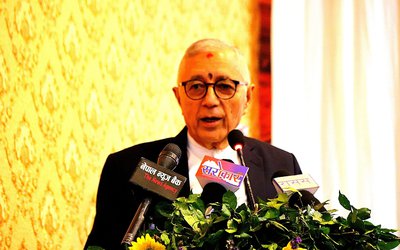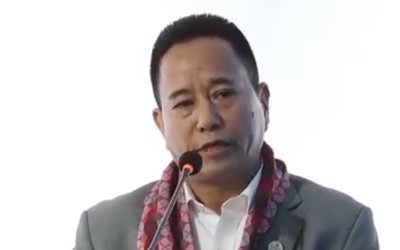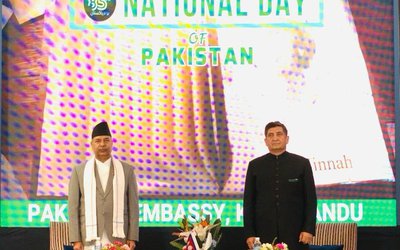
With plans of erecting the Kathmandu University School of Law (KUSL) solidified, the Steering Committee has been discussing the kind of five-year BBM-LLB program to be offered during the year 2014-2015, when the first batch of law students will arrive at the University.
The “Preliminary Feasibility Study” of the School of Law prepared by Nepal Constitution Foundation (NCF) in November, 2012, states that the five years will be comprised of a “traditional curriculum” with an additional focus on corporate legal subjects in the later years.
Anup Acharya, a member of the School of Law Steering Committee, said, “Corporate law is a combination of business, management, and law. In this sector of legal education, which includes entrepreneurship, the banking system, and developmental projects, there is a lack of good lawyers. The Kathmandu University is trying to address this problem and provide quality lawyers through its programme.”
Advocate Sunil Pokharel, the General Secretary of Nepal Bar Association, added, “Right now, there is a need for quality lawyers in the commercial and foreign sectors of Nepal. We need lawyers who will sell in the foreign market or at least are in high competition with lawyers from the neighbourhoods.”
Undergraduates of law will be trained extensively in accordance with two legal methods: case method (“a method of studying landmark cases”) and Socratic Method (“a method examining students on the reasoning of the court in the cases studied” [NCF study]).
Dr Sanjay Nath Khanal, a senior professor working at the Accreditation of the University, said that the new School of Law hopes to incorporate “hands-on experience in additional to theoretical aspects,” like “how to build and present a court case,” in the program. “The whole idea is that it shouldn’t only be the book,” he said.
The first-year students will be able to attend problem-solving workshops to tackle real world challenges that cover wide bodies of law. Legal research and various writing courses would also be on offer as of way of instilling essential skills needed for the practice of law in court and outside.
Not only within the classroom, but the course attempts to bring learning into informal and out-of-the-classroom experiences. These include reading groups which would provide students the opportunity to interact directly with their professors, many of whom will be recruited from abroad, and discuss matters of law and development, customary courts, terrorism, and climate change amongst others.
Acharya said that the main advantage of this interaction will be the “exchange of ideas.” He added, “International experts will come and learn about Nepal’s position on management and business. In return, in the weekly seminars, these professors will give new perspective on national and international issues of concern or something like a court’s decision on a case.”
Sabita Baral, a practicing senior lawyer, said, “Right now, law is a highly developing field in Nepal. The Nepal Bar Council is responsible for licensing lawyers and training new entrants in the profession by giving internships and so on. However, this rarely happens. Students newly out of their five-year long programs have no practical knowledge, and no reputed lawyer or firm will hire them, unless there are personal connections. There is no space in private offices, and students are not equipped with the practical skills needed in the court. In law schools of today, there is no parallel between practical skills and knowledge.”
To emphasize not only the theoretical aspects of the law, but also the practical skills that are lacking in students, as Baral states, the School of Law has clinical courses planned. For example, as Acharya mentioned, dummy courts will be established, with judges, witnesses, and lawyers who will be debating several cases. This way, students get the practical education of being a lawyer as well.
Dr Bipin Adhikari, a constitutional expert who is leading the School of Law Steering Committee, said, “Students will be allowed to attend moot courts, where they will observe and study legal proceedings. They will be encouraged to visit courts and interact with leading judges and prosecutors of the country. Regular exchange will be arranged with the Nepal Bar Association and its leading lawyers. The prosecutors from the office of the Attorney General will also be involved in training the students. Several similar opportunities will be given to the students to interact with business and management professionals. So it will be a compact course aimed at all-round development in the corporate law students.”
As undergraduates move to more advanced levels of learning, their courses would include “a mix of classroom, clinical works, and writing and cross registration credits” and selecting subjects that are consistent with the students’ interests. The University has planned two different programmes of study (general practice and corporate practice) to choose from when the time comes.
The University has available disciplinary opportunities within and outside the Kathmandu University for the students to be able to “experience law in practice and to understand how law appears from the perspective of other activities and approaches,” states the NCF report.
Towards the last two years of their course, students will be able to work in advanced seminars, writing projects, and clinical practice that test their knowledge, skill, and methodological tools in response to gripping legal issues of today, as the report states.
At the end of their first five years, graduates will be able to work towards pursuing the highest advanced degree in law: Master of Laws (LL.M).
Khanal added, “We are very much hopeful that the program will be a success. The advantage of a five-year program is that while it offers basics in the management, it has specializations within the law. Students can start with one area and pick up others along the way. Students will grasp the basics in both management and law by the time they graduate, but due to the program’s length of five years, it allows students to specialize in corporate laws.”
While the Steering Committee is very optimistic about the results, others say that a conclusion cannot be reached just yet. Pokharel, who has a long experience with the activities of the Nepal Bar Association, added, “The success of a law school depends on various things, such as the course of study, the teachers hired, the teaching methodology, and, ultimately, on the students themselves. As judiciary realizations and needs are further addressed, there will be a need for quality lawyers in those areas.”
He further added, “Looking at the production quality of Kathmandu University, we know that there are standards the School of Law will meet. However, we will have to wait to see how just successful it will be.”
- Highlights of KUSL’s Launching Ceremony
- Aug 17, 2014
- Labour Force Leaving The Country
- Mar 24, 2014
- Thinking about Nepal’s Think Tanks
- Nov 10, 2013
- JUDICIARY: Judging Judges
- Aug 30, 2013
- Kathmandu University’s Initiation of a Legal Education
- Aug 08, 2013
















